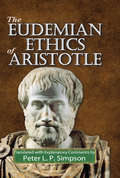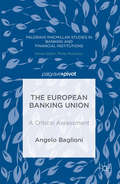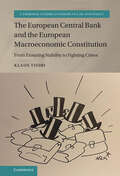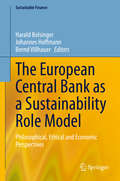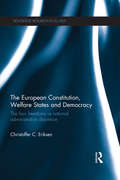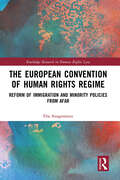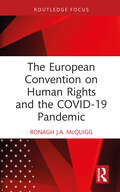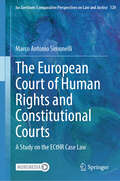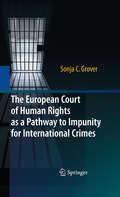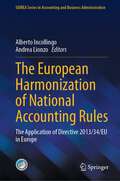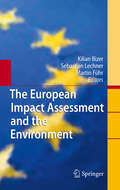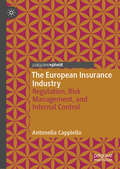- Table View
- List View
The Eucharist in Medieval Canon Law
by Thomas M. IzbickiThomas Izbicki presents a new examination of the relationship between the adoration of the sacrament and canon law from the twelfth to fifteenth centuries. The medieval Church believed Christ's glorified body was present in the Eucharist, the most central of the seven sacraments, and the Real Presence became explained as transubstantiation by university-trained theologians. Expressions of this belief included the drama of the elevated host and chalice, as well as processions with a host in an elaborate monstrance on the Feast of Corpus Christi. These affirmations of doctrine were governed by canon law, promulgated by popes and councils; and liturgical regulations were enforced by popes, bishops, archdeacons and inquisitors. Drawing on canon law collections and commentaries, synodal enactments, legal manuals and books about ecclesiastical offices, Izbicki presents the first systematic analysis of the Church's teaching about the regulation of the practice of the Eucharist.
The Eudemian Ethics (Oxford World's Classics)
by Aristotle Anthony Kenny"We are looking for the things that enable us to live a noble and happy life. . . and what prospects decent people will have of acquiring any of them. "The Eudemian Ethics is a major treatise on moral philosophy whose central concern is what makes life worth living. Aristotle considers the role of happiness, and what happiness consists of, and he analyses various factors that contribute to it: human agency, the relation between action and virtue,and the concept of virtue itself. Moral and intellectual virtues are classified and considered, and finally the roles of friendship and pleasure. It deals with the same issues as the better-known Nicomachean Ethics, with which it holds three books in common, and its special qualities, as well asthe similarities and differences between the two works, are of fundamental concern to anyone interested in Aristotle's philosophy. This is the first time the Eudemian Ethics has been published in its entirety in any modern language. Anthony Kenny's fine translation is accompanied by a lucid introduction and explanatory notes, which assist the reader in understanding this important work.
The Eudemian Ethics of Aristotle
by Peter L. SimpsonAmong the works on ethics in the Aristotelian corpus, there is no serious dispute among scholars that the Eudemian Ethics is authentic. The Eudemian Ethics is increasingly read and used by scholars as a useful support and confirmation and sometimes contrast to the Nicomachean Ethics. Yet, it remains a largely neglected work in the study of Aristotle's ethics, both among scholars and moral philosophers.Peter L. P. Simpson provides an analytical outline of the entire work together with summaries of each individual section, making the overall structure and detailed argument clear. His translation and explanatory notes include the common books that the Eudemian Ethics shares with the Nicomachean. This translation contains renderings of words and phrases, and proposals for emending the text that differ from what other translators and scholars have adopted.This translation is literal, without expansion or paraphrase, and yet also readable. A readable but literal translation is necessary because in the Eudemian Ethics, more than usual in Aristotle's writings, the logic of the argumentation can turn on the peculiar wording or order. Simpson explains the argumentation where necessary in notes and separate explanatory comments. This book is a fresh, twenty-first-century rendition of the work of one of the most eminent philosophers of all time.
The Eureka Myth: Creators, Innovators, and Everyday Intellectual Property
by Jessica SilbeyAre innovation and creativity helped or hindered by our intellectual property laws? In the two hundred plus years since the Constitution enshrined protections for those who create and innovate, we're still debating the merits of IP laws and whether or not they actually work as intended. Artists, scientists, businesses, and the lawyers who serve them, as well as the Americans who benefit from their creations all still wonder: what facilitates innovation and creativity in our digital age? And what role, if any, do our intellectual property laws play in the growth of innovation and creativity in the United States? Incentivizing the "progress of science and the useful arts" has been the goal of intellectual property law since our constitutional beginnings. The Eureka Myth cuts through the current debates and goes straight to the source: the artists and innovators themselves. Silbey makes sense of the intersections between intellectual property law and creative and innovative activity by centering on the stories told by artists, scientists, their employers, lawyers and managers, describing how and why they create and innovate and whether or how IP law plays a role in their activities. Their employers, business partners, managers, and lawyers also describe their role in facilitating the creative and innovative work. Silbey's connections and distinctions made between the stories and statutes serve to inform present and future innovative and creative communities. Breaking new ground in its examination of the U. S. economy and cultural identity, The Eureka Myth draws out new and surprising conclusions about the sometimes misinterpreted relationships between creativity and intellectual property protections.
The European Account Preservation Order Regulation: A Commentary
by Gilles Cuniberti Sara MiglioriniThe European Account Preservation Order (EAPO) Regulation provides a protective measure for creditors wishing to freeze the bank account of their debtor, preventing the transferral or withdrawal of funds. Courts can issue freezing measures over bank accounts located in other member states, thereby establishing a new remedy for cross-border debt recovery in Europe. <P><P>This book provides a detailed article-by-article commentary of the EAPO Regulation. It describes its legislative history and structure and carries out a critical analysis of its provisions and recitals, focusing on the practical implementation of the instrument. The commentary also provides additional focus on the interplay between the EAPO Regulation and the existing EU instruments and framework, and examines specific issues that the implementation of the Regulation might raise in member states. This is an important resource tool for practitioners, legal scholars and students interested in the theoretical and practical implications of the EAPO Regulation.<P> The unique article-by-article commentary ensures that none of the provisions of the Regulation are neglected and that all interpretative issues are addressed.<P> Incorporates the views and analysis of scholars of numerous member states including Germany, France, Spain and Italy.<P> Offers an in-depth analysis of two crucial issues which were not clearly addressed by the Regulation: its territorial scope and the exclusion of arbitration.
The European Arrest Warrant and EU Citizenship: EU Citizenship in Relation to Foreseeability Problems in the Surrender Procedure
by Joske GraatThis book offers an in-depth analysis of the relationship between EU citizenship, the European arrest warrant (EAW), and the legality principle. It focuses on the role of the EAW in relation to two foreseeability problems with which EU citizens – especially those who exercise free movement rights – could be confronted. These problems concern the foreseeability of specific national criminal laws at the time of the offense on the one hand and forum decisions on the other. The first part of the book addresses the extent to which these foreseeability problems and the role of the EAW therein are viewed as legality problems at the EU level and in three national legal orders (the Netherlands, Germany, and England and Wales).In turn, the second part of the book critically examines the current scope and content of the legality principle in light of the EU’s objective to offer its citizens an Area of Freedom, Security and Justice (AFSJ) in which both safety and free movement are guaranteed. As EU citizens often encounter foreseeability problems when exercising their free movement rights, it is argued that they should be protected by a transnational framework of fundamental rights. The book subsequently makes recommendations for a transnational interpretation of the legality principle, one which fits the normative context of the AFSJ as described in Article 3(2) TEU. On the basis of the evolution of EU citizenship over time, the book also develops two EU citizenship narratives and explains how they could contribute to transnational fundamental rights protection and a solution to foreseeability problems. With regard to arriving at concrete solutions, the book offers recommendations for EU legislation that could adequately remedy foreseeability problems and the role of the EAW therein.
The European Banking Regulation Handbook, Volume I: Theory of Banking Regulation, International Standards, Evolution and Institutional Aspects of European Banking Law
by Christos V. GortsosIn two volumes, this book covers in a comprehensive, internally balanced, systematic and detailed way the field of European Union (EU) banking law and regulation. In three parts, Volume I offers a brief introduction to the role of banks in the contemporary financial system and the theory of banking regulation, a thorough analysis of international financial standards which are contained in the sources of public international banking law (and of public international financial law, in general), a detailed presentation of the gradual evolution and the sources of EU banking law, as well as a precise analysis of the law-making process and the key institutional aspects of this branch of EU economic law. The standards and rules adopted and the institutions created in the aftermath of the (2007-2009) global financial crisis and the subsequent euro area fiscal crisis, as well as during the current pandemic crisis are discussed, as appropriate. A detailed analysis of the substantive aspects of EU banking law will follow in Volume II
The European Banking Union
by Angelo BaglioniWhy did European policy-makers introduce the Banking Union? Which are its main features? How does it affect banks and their customers? This book tries to answer these questions, by providing a clear description of the building blocks of the banking union, and by discussing the issues that still remain unanswered.
The European Banking Union: Supervision And Resolution (Palgrave Macmillan Studies in Banking and Financial Institutions)
by Giuseppe BoccuzziThe 2008 financial crisis all but brought down the financial system and real economies of industrial countries. The Banking Union took a broad approach to resolve the structural fragmentation and distortions in the European banking system which were major obstacles to a working single market for financial services. This book examines the numerous changes happening to European legislations for the prevention and management of banking crises. What emerges is a changing picture of regulations and institutions, of goals, tools and opinions, public and private, European and national all involved in the task. The book focuses on the new framework for banking crisis management, starting from the foundations of banking regulation and supervision. It explores the institutional architecture of banking supervision and crisis management, the powers of the authorities, the tools for administrative actions, the complexities of business and bankruptcy laws, individual rights and their legal guarantees.
The European Banking Union: Supervision and Resolution (Palgrave Macmillan Studies in Banking and Financial Institutions)
by Giuseppe BoccuzziThe 2008 financial crisis all but brought down the financial system and real economies of industrial countries. The Banking Union took a broad approach to resolve the structural fragmentation and distortions in the European banking system which were major obstacles to a working single market for financial services. This book examines the numerous changes happening to European legislations for the prevention and management of banking crises. What emerges is a changing picture of regulations and institutions, of goals, tools and opinions, public and private, European and national all involved in the task. The book focuses on the new framework for banking crisis management, starting from the foundations of banking regulation and supervision. It explores the institutional architecture of banking supervision and crisis management, the powers of the authorities, the tools for administrative actions, the complexities of business and bankruptcy laws, individual rights and their legal guarantees.
The European Central Bank and the European Macroeconomic Constitution: From Ensuring Stability to Fighting Crises (Cambridge Studies in European Law and Policy)
by Klaus TuoriThe book is about money, central banking and constitutions. It explains how the European Central Bank was established to ensure stability and prosperity for the euro area. The ECB was guided and controlled by a coherent European Macroeconomic Constitution. However, this model has failed during recurring crises, and the ECB has started to act as the euro area fire brigade. Consequently, it is pushing the boundaries of monetary policy, and with that challenging the accountability mechanisms and fundamentally also the democratic legitimacy of the EMU. The book sheds light on this complex economic-constitutional setting with a view on the future. The imbalance between various new operations and a single price stability objective is difficult to remedy. New objectives of financial stability, economic adjustment and environmental sustainability can cause fundamental ruptures between the ECB's formal role and its actions, and they also dangerously overburden monetary policy moving forward with substantial risks.
The European Central Bank as a Sustainability Role Model: Philosophical, Ethical and Economic Perspectives (Sustainable Finance)
by Harald Bolsinger Johannes Hoffmann Bernd VillhauerThis book examines selected actions and investments of the European Central Bank (ECB) from a climate and sustainability standpoint. Shedding new light on the topic from various angles – ethical, philosophical, political, economical and legal – it situates sustainability mainstreaming in the finance and investment field at all levels. The former ECB President Mario Draghi once said that he considered sustainable development and an intact environment to be human rights, and therefore enshrined in the EU Charter of Fundamental Rights. The acting ECB President Christine Lagarde added that the future path for the climate is uncertain, but it would remain within our power to influence it. However, with all that in mind the ECB’s policy of buying assets as securities is often questionable. This volume analyzes these actions in connection with sustainability, and puts forward practical recommendations for improving the ECB’s investment strategy on its way creating a sustainable financial market.
The European Commission and Bureaucratic Autonomy
by Antonis A. Ellinas Ezra SuleimanThis book examines the struggle of the European Union bureaucracy to maintain its autonomy in an increasingly complex institutional setting and adverse political environment. Using an original survey of nearly two hundred top European Commission officials, it shows that the European Union is a coherent organization that shares a common culture of supranationalism. The European Union's multicephalous structure of political authority limits the capacity of European politicians to curb the autonomy of the Commission but tends to undermine the legitimacy of the organization, which finds itself under persistent political attacks. These attacks inadvertently help the organization bolster its defenses against the external threats and trigger internal legitimation processes that reinforce the devotion of its employees to its institutional mission. The book helps disentangle the complexity of the Commission and makes a contribution to the study of international bureaucracies, a topic that has received little attention.
The European Commission�s Energy and Climate Policy
by Jonas DregerThis book offers a deep insight into the genesis and development of the European Commission's energy and climate legislation, focusing on the interplay of politics and science. How does the Commission react when confronted with knowledge? According to the author, the Commission functions as catalyst transforming knowledge into politics.
The European Company
by Dirk Van Gerven Paul StormThe European company ('SE') is a legal entity offering a European perspective for businesses, which became a reality on 8 October 2004. Its purpose is to allow businesses that wish to extend their activities beyond their home Member State to operate throughout the EU on the basis of a single set of rules and a unified management system. This book explains how to set up and organise a European company, and sets out the text of the relevant EC instruments that serve as its legal basis, as well as the national implementing legislation. It is essential for businesses and their advisers to understand the implementing legislation of the relevant Member States in deciding where to establish an SE. This book provides comprehensive coverage of such legislation in all Member States of the European Economic Area which have, as at 1 July 2005, implemented the Regulation containing the SE statute and the Directive on employee involvement in the SE.
The European Constitution, Welfare States and Democracy: The Four Freedoms vs National Administrative Discretion (Routledge Research in EU Law)
by Christoffer C. EriksenThis book explores how the right to the free movement of goods, persons, services and capital in the European Union legal order affects welfare states. These "four freedoms", as they are known, are vital instruments for the protection of a European market unencumbered by internal frontiers. The European Constitution, Welfare States and Democracy explore the relationships and conflicts that have emerged between the European constitution and the legal regulation of mixed economies and markets within welfare-states. In particular, it examines the threat posed to the discretionary powers enjoyed by national governments and administrative authorities. Christoffer C. Eriksen has undertaken a comprehensive analysis of a series of judgments in which the European Court of Justice has clearly indicated the ways in which the four freedoms may be incompatible with the current practice of entrusting national administrative authorities with discretionary powers and thus highlights how the four freedoms are provoking democratic dilemmas, previously neglected in the academic literature. The book is written in a style which communicates beyond an audience of specialized legal scholars and although it includes analysis of black letter law, its methodology also draws from the disciplines of philosophy, political science, and sociology.
The European Convention of Human Rights Regime: Reform of Immigration and Minority Policies from Afar (Routledge Research in Human Rights Law)
by Dia AnagnostouPrompted by an unprecedented rise of litigation since the 1990s, this book examines how the European Convention of Human Rights (ECHR) system and the Strasbourg Court interact with states and non-governmental actors to influence domestic change. Focusing on European Court of Human Rights litigation and state implementation of judgments related to minority discrimination and asylum/migration, it argues that a fundamental transformation of the Convention system has been under way. Repeat and strategic litigation, shifting methods of supervision and state implementation to remedy systemic violations, and above all the growing engagement of civil society and non-governmental actors, have prompted a distinctive trend of human rights experimentalism. The emergence of experimentalism has profound implications for the legitimacy, effectiveness and further reform of the ECHR system. This study provides an original constitutive account of regional human rights regimes and how they are activated by societal actors to claim rights, advance case law, and pressure for domestic legal and policy change. It will be of interest to international law and international relations scholars, political scientists, specialists on the ECHR, the Strasbourg Court, as well as to scholars interested in the human rights of immigrants and minorities.
The European Convention on Human Rights and the COVID-19 Pandemic (Routledge Research in Human Rights Law)
by Ronagh J.A. McQuiggThis book provides detailed analysis of the applicability of the provisions of the European Convention on Human Rights to issues raised by the COVID-19 pandemic. It encompasses in-depth discussion of the emerging jurisprudence of the European Court of Human Rights relating to issues arising from the pandemic. To date, a substantial number of complaints concerning such issues have been made to the Court. Human rights claims in the context of the pandemic fall into two broad categories: those based on arguments that states did not put in place sufficient measures to protect individuals from the virus and those entailing arguments that the measures put in place themselves involved breaches of rights. The essential question with which the European Court of Human Rights must grapple is how to adjudicate on the correct balance which should have been struck. The book argues that the Court should be cautious of finding breaches of the European Convention on Human Rights in cases involving public restrictions which were applied for the purpose of protecting life and health in response to a global pandemic. If the concept of a human rights violation is defined too broadly, it dilutes the seriousness of such a breach. In particular, it is argued that to preserve the legitimacy of human rights law, the Court must be cautious of applying an overly narrow margin of appreciation in such cases. The work will be of interest to academics, researchers and policymakers working in the area of human rights.
The European Court of Human Rights and Constitutional Courts: A Study on the ECtHR Case Law (Ius Gentium: Comparative Perspectives on Law and Justice #120)
by Marco Antonio SimonelliThis book investigates the relationship between the European Court of Human Rights (ECtHR) and national constitutional courts by providing a more general assessment as seen from the former’s perspective. Adopting an empirical approach, the book reviews all the case law of the ECtHR in which constitutional courts are cited. This represents more than 3,000 rulings spanning more than fifty years, from the establishment of the Strasbourg Court in 1959 – when only three constitutional courts were active – to 1 January 2023, when there were more than thirty active constitutional courts in the Council of Europe’s Member States. This wide-ranging empirical study pursue several different goals. First, the book provides a quantitative assessment of the relevance of constitutional courts in ECtHR case law and presents weighted data on the frequency and chronological evolution of the citations, as well as individual statistics for each national constitutional court. Second, it assesses the extent of the rationalisation of constitutional justice systems conducted by the Strasbourg Court and defines the standards and elements of the right to a fair constitutional trial under Article 6 ECHR. Finally, combining this extensive dataset with qualitative analysis, the book evaluates how the Strasbourg Court interacts with each constitutional jurisdiction and provides a qualitative assessment of this relationship from the standpoint of Strasbourg case law.
The European Court of Human Rights as a Pathway to Impunity for International Crimes
by Sonja C. GroverThis book presents contentious case rulings by the European Court of Human Rights providing extensive case notes and questions. The book elucidates just how the Court came in those cases to contribute to lack of State accountability and to impunity for individual perpetrators of international crimes. Issues addressed include the Court's: derogation of the jus cogens nature of certain fundamental human rights, grant of State immunity from any liability for systemic torture, unjustified failure to classify certain European Convention on Human Rights violations as international crimes; and improper declining of jurisdiction where States participated in a U.N. peace-building mission that itself involved serious violations of the U.N. Charter human rights principles. The book argues that the moral integrity of the Court's rulings (rulings that promote and protect international human rights) is an essential aspect of promoting the internationalization of the rule of law.
The European Court of Human Rights in the Post-Cold War Era: Universality in Transition (Routledge Research in Human Rights Law)
by James A. SweeneyThe European Court of Human Rights in the Post-Cold War Era: Universality in Transition examines transitional justice from the perspective of its impact on the universality of human rights, taking the jurisprudence of the European Court of Human Rights as its detailed case study. The problem is twofold: there are questions about differences in human rights standards between transitional and non-transitional situations, and about differences between transitions. The European Court has been a vital part of European democratic consolidation and integration for over half a century, setting meaningful standards and offering legal remedies to the individually repressed, the politically vulnerable, and the socially excluded. After their emancipation from Soviet influence in the 1990s, and with membership of the European Union in mind for many, the new democracies of Central and Eastern Europe flocked to the Convention system. The voluminous jurisprudence of the European Court of Human Rights can now give us some clear information about how an international human rights law regime can interact with transitional justice. The jurisprudence is divided between those cases concerning the human rights implications of explicitly transitional policies (such as lustration), and those that involve impacts upon specific democratic rights during the transition. The book presents a close examination of claims by states that transitional policies and priorities require a level of deference from the Strasbourg institutions. The book proposes that states’ claims for leeway from international human rights supervisory mechanisms during times of transition can be characterised not as arguments for cultural relativism, but for ‘transitional relativism’.
The European Harmonization of National Accounting Rules: The Application of Directive 2013/34/EU in Europe (SIDREA Series in Accounting and Business Administration)
by Alberto Incollingo Andrea LionzoWith Directive 2013/34/EU - which replaced the 4th and 7th accounting Directives - a new step towards European accounting harmonization has been taken: accounting rules on private firms have been further standardized and, at the same time, brought closer to IAS/IFRS. This book develops a comparative analysis of the most relevant issues in the process of preparing the financial statements after the recent transposition of the aforementioned Directive into the local accounting rules and standards. This book is of interest for several reasons. First, private firms, which are not necessarily small-medium sized companies, are the most prevalent and the engine of growth in all European countries. At the same time, the international academic literature is mainly devoted to listed companies, due to the limited availability of data for private companies and the idea that accounting information is less relevant for this kind of companies. In addition, the analysis contained in the book is the result of the work of more than 30 European researchers, who contributed to both a vertical analysis of eight countries (Germany, Spain, Italy, France, the Netherlands, the United Kingdom, Sweden, and Denmark) and a horizontal analysis of the most relevant cross-cutting issues (fundamental principles, financial statement formats, impairment losses, capital reserves and profit distribution, income taxes, and non-financial reporting). More specifically, the book aims to examine, from a comparative perspective, the methods of application of the Directive in Europe, in parallel with the evolutionary processes of national GAAPs, in order to verify the impact of both legal regulations and professional rules on the quality and comparability of accounting information, as well as the degree of convergence towards the IAS/IFRS model.
The European Health Data Space: Examining A New Era in Data Protection
by Santa Slokenberga Katharina Ó Cathaoir Mahsa ShabaniThis timely volume provides a comprehensive examination of how the proposed new European Health Data Space (EHDS) legislation will impact upon health and genetic data, individual privacy and providers of health services.With the current legal framework recognised as insufficient in protecting data-related rights, the book spotlights the opportunities and challenges posed by the EHDS in balancing the interests of individuals with policymakers and researchers. It considers the impact on individual EU member states while highlighting issues such as changes to patients’ rights, wearable technology, developments in e-health and the secondary use of medical data. Critically, it also examines how the EHDS will operate within existing legal frameworks, including the General Data Protection Regulation, the Data Governance Act and the Data Act.Including contributions from some of the leading scholars in this area, this groundbreaking book will be key reading for students and researchers across law and public health.Chapters 2, 10 and 11 have been made available under a Creative Commons Attribution-NonCommercial-NoDerivatives (CC-BY-NC-ND) 4.0 license. Chapter 5 has been made available under a Creative Commons Attribution (CC-BY) 4.0 license.
The European Impact Assessment and the Environment
by Martin Führ Sebastian Lechner Kilian BizerThe European Commission requires an impact assessment report for any regulation proposed. This book analyzes the quality of impact assessments and discusses deficits and possible improvements. Based on 30 case studies of impact assessments, an institutional analysis of the relevant actors is conducted, which shows that there are many shortcomings, among them an incentive problem concerning desk officers in the European Commission. The book includes various articles which address controversial problems and possible solutions. It offers a comprehensive overview of the practice of impact assessment in the EC, as well as an institutional analysis of the processes involved and of the checks and balances between politicians and their administration.
The European Insurance Industry: Regulation, Risk Management, and Internal Control
by Antonella CappielloThis book analyses the methodologies and functions of a systemic approach to risk governance and internal control capable of tackling the complexity of the insurance business. It focuses on the main trends currently impacting the insurance industry, characterized by new operators, new products and services, new tools, new styles of competition, and new risks. It provides tips and empirical contributions addressing the role of sound internal control and risk management models within an ongoing revision of prudential regulation to better deal with the evolving scenario where insurance activities are becoming increasingly risky and complex. The book is of particular interest to scholars and students of insurance and financial services and practitioners in the insurance industry.


